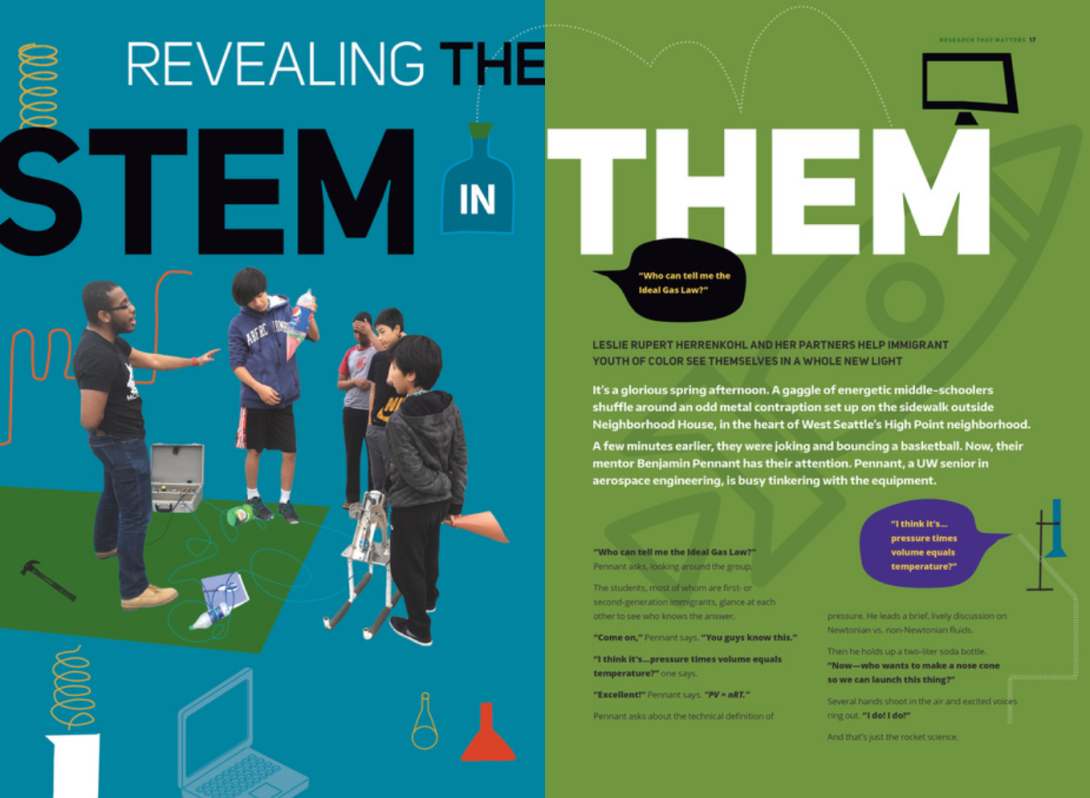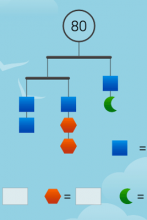Resources included in these libraries were submitted by ITEST projects or STELAR and are relevant to the work of the NSF ITEST Program. PDFs and/or URLs to the original resource are included in the resource description whenever possible. In some cases, full text publications are located behind publishers’ paywalls and a fee or membership to the third party site may be required for access. Permission for use must be requested through the publisher or author listed in each entry.
UW College of Education Research That Matters story on STUDIO
Publication
Explore how the UW College of Education is partnering with teachers, school leaders, families, social service agencies and community organizations throughout Washington State and beyond to make learning come alive for all students.
SolveMe Mobiles Video
Publication
This video describes the SolveMe Mobiles app, which is designed to support algebraic reasoning in a fun and interactive format. These colorful puzzles help algebra and pre-algebra students as well as puzzle-lovers of all ages establish and strengthen the logic of solving equations for unknown values. Play SolveMe Mobiles at http://solveme.edc.org or learn more about the project.
ITEST Data Brief: ITEST Dissemination Strategies
PublicationITEST Data Brief Volume 3, Issue 4, January 2017. This data brief explores the strategies that ITEST projects use to communicate their findings, including the products they create, where they disseminate their work, and what audiences they reach.
Drawing on Place and Culture for Climate Change in Native Communities
PublicationChapter in Mueller, M. & Tippins, D. (Eds.) EcoJustice, Citizen Science and Youth Activism: Situated Tensions for Science Education. Springer International Publishing.Book description: This volume draws on the ecojustice, citizen science and youth activism literature base in science education and applies the ideas to situated tensions as they are either analyzed theoretically or praxiologically within science education pedagogy. It uses ecojustice to evaluate the holistic connections between cultural and natural systems, environmentalism, sustainability and Earth-friendly marketing trends, and
Active Learning Approaches to Integrating Technology into Middle School Science Curriculum Based on 21st Century Skills
PublicationChapter in X.Ge, D. Ifenthaler, & J.M. Spector (Eds.). Full Steam Ahead: Emerging Technologies for STEAM. New York: Springer Academic.Book description: This theory-to-practice guide offers leading-edge ideas for wide-scale curriculum reform in sciences, technology, engineering, the arts, and mathematics--the STEAM subjects. Chapters emphasize the critical importance of current and emerging digital technologies in bringing STEM education up to speed and implementing changes to curricula at the classroom level. Of particular interest are the diverse ways of integrating the liberal arts into STEM
Coupling Geospatial and Computer Modeling Technologies to Engage High School Students in Learning Urban Ecology
PublicationChapter 11 in M. Urban and D. Falvo (Eds) Improving K-12 STEM Education Outcomes through Technological Integration. IGI Global: Hershey, PA.Book description: The application of technology in classroom settings has equipped educators with innovative tools and techniques for effective teaching practice. Integrating digital technologies at the elementary and secondary levels helps to enrich the students' learning experience and maximize competency in the areas of science, technology, engineering, and mathematics. "Improving K-12 STEM Education Outcomes through Technological Integration" focuses
Scalable Game Design: A Strategy to Bring Systemic Computer Science Education to Schools through Game Design and Simulation Creation
PublicationAn educated citizenry that participates in and contributes to science technology engineering and mathematics innovation in the 21st century will require broad literacy and skills in computer science (CS). School systems will need to give increased attention to opportunities for students to engage in computational thinking and ways to promote a deeper understanding of how technologies and software are used as design tools. However, K-12 students in the United States are facing a broken pipeline for CS education. In response to this problem, we have developed the Scalable Game Design curriculum
To Customize or Not to Customize? Exploring Science Teacher Customization in an Online Lesson Portal
PublicationNew technologies are increasingly giving science teachers the ability to access and customize science lessons. However, there is substantial debate in the literature about whether and under what conditions teacher customization benefit student learning. In this study, we examined teacher customization of inquiry-based science lessons from an online lesson portal. We found that students who completed teacher-customized lessons had greater improvements in science content understanding than students who completed non-customized lessons. To expand upon this finding, we examined four case studies
How Do Propensity Score Methods Measure Up in the Presence of Measurement Error? A Monte Carlo Study
PublicationConsidering that the absence of measurement error in research is a rare phenomenon and its effects can be dramatic, we examine the impact of measurement error on propensity score (PS) analysis used to minimize selection bias in behavioral and social observational studies. A Monte Carlo study was conducted to explore the effects of measurement error on the treatment effect and balance estimates in PS analysis across seven different PS conditioning methods. In general, the results indicate that even low levels of measurement error in the covariates lead to substantial bias in estimates of
Elements of Design-Based Science Activities That Affect Students' Motivation
PublicationThe primary purpose of this study was to examine the ways in which a 12-week afterschool science and engineering program affected middle school students' motivation to engage in science and engineering activities. We used current motivation research and theory as a conceptual framework to assess 14 students' motivation through questionnaires, structured interviews, and observations. Students reported that during the activities they perceived that they were empowered to make choices in how to complete things, the activities were useful to them, they could succeed in the activities, they enjoyed